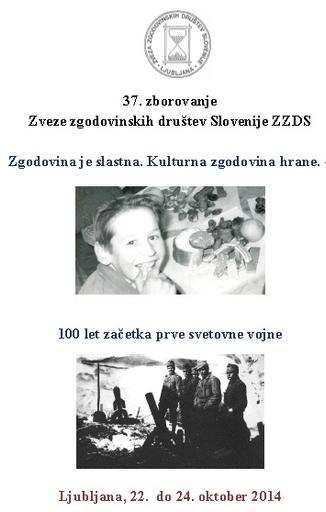
/
Dogodki
/
Konference
The Spirit of 1914 in Austria-Hungary


To delo avtorja Mark Cornwall je ponujeno pod Creative Commons Priznanje avtorstva-Nekomercialno-Brez predelav 4.0 Mednarodna
Datoteke (1)
Opis
One hundred years ago in October 1914, it might be said that the ‘spirit of 1914’ had already disappeared across Austria-Hungary. This was true among civilians in Ljubljana or Prague, or even in Vienna or Budapest where people had first been most enthusiastic about the war. But it was true too for many soldiers at the front, where the initial excitement about victory was quickly disappointed. The Habsburg armies did not quickly crush little Serbia; nor did they manage a quick victory over Russia. Instead, the troops were retreating right back into Galicia, while in the Balkans it was Serbia’s army that was penetrating into Bosnia. This suggests to us immediately that the ‘spirit of 1914’ – the enthusiasm that accompanied the outbreak of war – lasted only a few months. However, this time period as measured in days and weeks was also relative because of what was actually experienced. Many civilians and soldiers felt in the summer of 1914 that they had lived a whole lifetime. One officer wrote later that by late August he had drawn a line under his former life, for he was now entering a different world where events were constantly speeding up. The war, which started in an enthusiastic ‘spirit’, began within two months to transform itself from life into death. Indeed, the spirit of 1914 disappeared as the phenomenon of mass death began to appear in towns and villages across the monarchy. This lecture explores what we can learn from this short episode, this ‘spirit of 1914.’ It explores the different mindsets of those who entered the war, but also the different loyalties that existed in the late Habsburg monarchy: a complex mixture of imperial, national and regional. If the war became an experiment in a true multinational (Habsburg) mission, the ‘spirit of 1914’ was the start of that mission and the authorities tried to capture and prolong it for as long as possible. What was this ‘spirit’, and how can historians measure it? Who was directing it and how long did it really last? The answers can tell us much about why the Habsburg monarchy failed in its final mission and why it disintegrated in 1918.
Metapodatki (11)
- identifikatorhttps://hdl.handle.net/11686/37577
- naslov
- The Spirit of 1914 in Austria-Hungary
- avtor
- Mark Cornwall
- predmet
- Avstro-ogrska
- 1914
- prva svetovna vojna
- Austria-Hungary
- 1914
- World War I
- opis
- One hundred years ago in October 1914, it might be said that the ‘spirit of 1914’ had already disappeared across Austria-Hungary. This was true among civilians in Ljubljana or Prague, or even in Vienna or Budapest where people had first been most enthusiastic about the war. But it was true too for many soldiers at the front, where the initial excitement about victory was quickly disappointed. The Habsburg armies did not quickly crush little Serbia; nor did they manage a quick victory over Russia. Instead, the troops were retreating right back into Galicia, while in the Balkans it was Serbia’s army that was penetrating into Bosnia. This suggests to us immediately that the ‘spirit of 1914’ – the enthusiasm that accompanied the outbreak of war – lasted only a few months. However, this time period as measured in days and weeks was also relative because of what was actually experienced. Many civilians and soldiers felt in the summer of 1914 that they had lived a whole lifetime. One officer wrote later that by late August he had drawn a line under his former life, for he was now entering a different world where events were constantly speeding up. The war, which started in an enthusiastic ‘spirit’, began within two months to transform itself from life into death. Indeed, the spirit of 1914 disappeared as the phenomenon of mass death began to appear in towns and villages across the monarchy. This lecture explores what we can learn from this short episode, this ‘spirit of 1914.’ It explores the different mindsets of those who entered the war, but also the different loyalties that existed in the late Habsburg monarchy: a complex mixture of imperial, national and regional. If the war became an experiment in a true multinational (Habsburg) mission, the ‘spirit of 1914’ was the start of that mission and the authorities tried to capture and prolong it for as long as possible. What was this ‘spirit’, and how can historians measure it? Who was directing it and how long did it really last? The answers can tell us much about why the Habsburg monarchy failed in its final mission and why it disintegrated in 1918.
- založnik
- Zveza zgodovinskih društev Slovenije
- Inštitut za novejšo zgodovino
- datum
- 2014
- tip
- video
- jezik
- Angleščina
- jeDelOd
- pravice
- licenca: ccByNcNd
Seznam literature v delu (32)
| Stran | Avtor | Naslov | Vir | Kraj | Založba | Leto |
|---|---|---|---|---|---|---|
| Bobič ; Pavlina | War and faith : the Catholic Church in Slovenia, 1914-1918 | Leiden ; Boston | Brill | 2012 | ||
| Cornwall ; Mark | The Devil’s Wall : The Nationalist Youth Mission of Heinz Rutha | Cambridge MA | Harvard University Press | 2012 | ||
| Cornwall ; Mark | The First World War | Kafka in Context, edited by Carolin Duttlinger | Cambridge | Cambridge University Press | 2016 | |
| Farrar ; L.L. | Reluctant Warriors : Public Opinion on War during the July Crisis 1914 | East European Quarterly | 1982 | |||
| Freifeld ; Alice | Nationalism and the Crowd in Liberal Hungary 1848-1914 | Washington, DC | Woodrow Wilson Center Press | 2000 | ||
| Führ ; Christoph | Das k.u.k. Armeeoberkomando und die Innenpolitik in Österreich : 1914-1917 | Graz ; Wien ; Köln | Hermann Böhlhaus Nachf. | 1968 | ||
| Galántai ; József | Hungary in the first world war | Budapest | Akadémiai Kiadó | 1989 | ||
| Glaise-Horstenau ; Edmund, von | Die Katastrophe : Die Zertrümmerung Österreich-Ungarns und das Werden der Nachfolgestaaten | Zürich; Leipzig; Vienna | Amalthea-Verlag | 1929 | ||
| Glaise-Horstenau ; Edmund, von | Ein General im Zwielicht : Die Erinnerungen Edmund Glaises von Horstenau. Vol. 1, edited by Peter Broucek | Vienna; Cologne; Graz | Böhlau | 1980 | ||
| Österreich-Ungarns letzter Krieg : 1914 - 1918. Bd 1, Das Kriegsjahr 1914 | Wien | Verlag der Militärwissenschaftlichen Mitteilungen | 1931 | |||
| Hajdu ; Tibor | 1914: A magyar közvélemény alakulása a hadüzenet előtt és után | Hadtörténelni közlemények | 2014 | |||
| Healy ; Maureen | Vienna and the fall of the Habsburg Empire : total war and everyday life in World War I | Cambridge | Cambridge University Press | 2004 | ||
| Heiss ; Hans | Andere Fronten : Volkstimmung und Volkserfahrung in Tirol während des Ersten Weltkrieges, edited by Klaus Eisterer, and Rolf Steiniger | Tirol und der Erste Weltkrieg | Innsbruck; Vienna | Österreichischer Studien Verlag | 1995 | |
| Langhans ; Daniel | Der Reichsbund der deutschen katholischen Jugend in der Tschechoslowakei 1918-1938 | Bonn | Kulturstiftung der Dt. Vertriebenen | 1990 | ||
| Lunzer ; Heinz | Hofmannsthals politische Tätigkeit in den Jahren 1914-1917 | Frankfurt a.M., Berne | Peter Lang | 1981 | ||
| Moll ; Martin | Kein Burgfrieden : der deutsch-slowenische Nationalitätenkonflikt in der Steiermark 1900-1918 | Innsbruck ; Wien ; Bozen | StudienVerlag | 2007 | ||
| Neugebauer ; Wolfgang | Bauvolk der kommenden Welt : Geschichte der sozialitischen Jugendbewegung in Österreich | Vienna | Veröffentlichungen des Ludwig-Boltzmann-Instituts für Geschichte der Arbeiterbewegung | 1975 | ||
| Orzoff ; Andrea | The Empire without Qualities : Austro-Hungarian Newspapers and the Outbreak of War in 1914 | A Call to Arms: Propaganda, Public Opinion and Newspapers in the Great War, edited by Troy R.E. Paddock | Westport CT | Praeger | 2004 | |
| Rauchensteiner ; Manfried | Der Erste Weltkrieg und das Ende der Habsburgermonarchie 1914-1918 | Wien ; Köln ; Weimar | Böhlau | 2013 | ||
| Sanders ; Ivan | Hungarian Writers and Literature in World War I. | East Central European Society in World War I, edited by Béla Király, and Nándor Dreisziger | New York | Columbia University Press | 1985 | |
| Schneider ; Constantin | Constantin Schneider : die Kriegserinnerungen 1914-1919 | Wien | Böhlau | 2003 | ||
| Sondhaus ; Lawrence | Franz Conrad von Hötzendorf : architect of the apocalypse | Boston ; Leiden ; Cologne | Humanities Press | 2000 | ||
| Stauda ; Johannes | Der Wandervogel in Böhmen, 1911-1920 : edited by Kurt Oberdorffer, 1975-1978 | Reutlingen | Verlag Harwalik | 1975 | ||
| Strobl ; Karl, Hans | K.P.Qu. Geschichten und Bilder aus dem österreichischen Kriegspressequartier | Reichenberg | Heimatsöhne | 1928 | ||
| Šedivý ; Ivan | Češi, české země a velká válka 1914-1918 | Prague | Lidové noviny | 2001 | ||
| Timms ; Edward | Karl Kraus: Apocalyptic Satirist : Culture and Catastrophe in Habsburg Vienna | New Haven; London | Yale University Press | 1986 | ||
| Tobolka ; Zdeněk, Václav | Můj deník z první světové války | Prague | Karolinum | 2008 | ||
| Valiani ; Leo | The End of Austria-Hungary | London | Alfred A. Knopf | 1973 | ||
| Verhey ; Jeffrey | The spirit of 1914 : militarism, myth and mobilization in Germany | Cambridge ; New York | Cambridge University Press | 2000 | ||
| Watson ; Alexander | Ring of steel : Germany and Austria-Hungary in World War I | New York | Basic Books | 2014 | ||
| Yates ; W. E., Schnitzler | Hofmannsthal and the Austrian Theatre | New Haven, London | Yale University Press | 1992 | ||
| Zombory-Moldován ; Béla | The Burning of the World : A Memoir of 1914 | New York | New York Review of Books | 2014 |